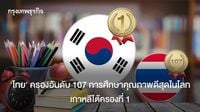Thailand has made significant strides in global happiness rankings, moving up nine spots to rank 49th in the World Happiness Report of 2025, according to recent information released by the Office of the Prime Minister. This report, which assesses happiness across nations, reveals that Finland continues to hold the title of the happiest country in the world for the eighth consecutive year. In the Southeast Asian region, Thailand stands third, trailing only Singapore and Vietnam, according to Mr. Anukul Phetsathanusat, the Deputy Permanent Secretary of the Ministry of Digital Economy and Society, who shared this analysis on March 25, 2025.
The World Happiness Report was compiled by the University of Oxford in partnership with other institutions and is based on data gathered from the Gallup World Poll and additional sources. Thailand's score increased from the previous year's 58th position, reflecting an average happiness score of 6.22 this year. This improvement highlights Thailand's status as the country with the highest growth in happiness in Asia.
When comparing happiness rankings among members of the Association of Southeast Asian Nations (ASEAN), Thailand ranks third, behind Singapore, which is now at 34th, and Vietnam at 46th. Other ASEAN nations follow Thailand at the 49th spot, including the Philippines at 57th, Malaysia at 64th, Indonesia at 83rd, Laos at 93rd, Cambodia at 124th, and Myanmar at 126th.
Several factors contributed to Thailand's notable rise in the happiness index. The report highlights six critical elements impacting happiness: perceptions of corruption scored at 0.04, freedom at 0.93, social support at 1.55 (an increase), life expectancy at 0.63, generosity at 0.22, and GDP per capita at 1.43. Particularly noteworthy is Thailand's high ranking in social support, which places it 8th globally, emphasizing the strong communal and familial relationships that are key to Thai culture.
Despite this progress, Mr. Anukul emphasized that Thailand must work towards enhancing the overall well-being of its citizens to maintain and improve happiness levels sustainably. The economic perception has improved, as indicated by the GDP per capita ranking however, Thailand currently sits at 81st in the world for this factor. The current trends depict a positive trajectory, reflecting increased economic stability amidst ongoing developments.
In another study concerning education quality, released by World Population Review for 2024, Thailand was ranked 107th among global education systems, placing 8th in the ASEAN region. Countries like South Korea, Denmark, and the Netherlands topped the education ranking, highlighting that Thailand has substantial room for improvement. The report stated that effective education systems tend to correlate closely with a nation's overall economic health and living standards.
According to the Global Partnership for Education, education is not merely a statistic—it's a fundamental right that contributes to the development of human potential, social equity, and economic progress. Nelson Mandela once remarked, “Education is the most powerful weapon which you can use to change the world,” underscoring education's critical role in societal advancement.
Among ASEAN countries, educational performance ranks as follows: Singapore (1st), Brunei (2nd), Vietnam (3rd), Indonesia (4th), Philippines (5th), Malaysia (6th), Laos (7th), Thailand (8th), Myanmar (9th), and Cambodia (10th). The ranking process utilizes survey data from 78 nations, evaluating perceptions regarding public education and determining the educational system's quality and university enrollment levels.
Furthermore, BBC Thai revealed concerns regarding the accuracy of the World Population Review’s education rankings, citing that the data was based on outdated information from 2017. Critiques from Thailand's Education Council argued that the report might not reflect the current quality of the education system effectively, and its methodology lacks transparency.
In response, the World Top 20 ranking presented by the NJMED organization relies on data from the United Nations and UNICEF, focusing on educational resource allocation and safety for students. However, NJMED acknowledged that less than 25% of countries provide updated data annually, causing significant gaps in the current rankings.
Dr. Dilaka Lathapipat from the World Bank highlighted that the factors utilized by both organizations may be too rudimentary to genuinely represent education quality, stating that metrics such as literacy rates and school enrollment don't sufficiently capture the depth of educational quality when compared to standardized assessments like PISA (Programme for International Student Assessment), which considers critical thinking and problem-solving capabilities.
According to PISA results from the last assessment, Thailand ranked fifth out of eight ASEAN nations, reflecting an increasingly worrisome trend as 68% of 15-year-old Thai students failed to meet basic math proficiency. With upcoming assessments in 2025 expected to provide clearer insights, a comprehensive evaluation of Thailand's educational landscape remains vital for future improvement.
In conclusion, while Thailand's gains in happiness rankings present a hopeful outlook, its position in global education reflects areas needing urgent attention. Ensuring the well-being of citizens through social support and economic growth must parallel simultaneous educational reforms aimed at enhancing the quality of life sustainably.






